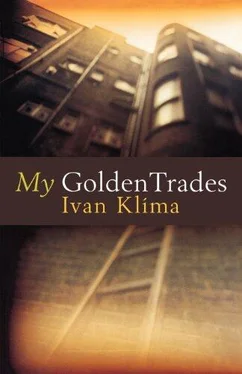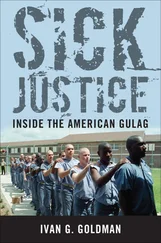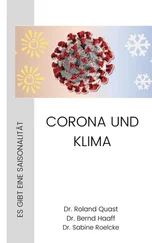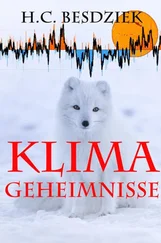Ivan Klima - My Golden Trades
Здесь есть возможность читать онлайн «Ivan Klima - My Golden Trades» весь текст электронной книги совершенно бесплатно (целиком полную версию без сокращений). В некоторых случаях можно слушать аудио, скачать через торрент в формате fb2 и присутствует краткое содержание. Год выпуска: 1998, Издательство: Granta UK, Жанр: Современная проза, на английском языке. Описание произведения, (предисловие) а так же отзывы посетителей доступны на портале библиотеки ЛибКат.
- Название:My Golden Trades
- Автор:
- Издательство:Granta UK
- Жанр:
- Год:1998
- ISBN:нет данных
- Рейтинг книги:4 / 5. Голосов: 1
-
Избранное:Добавить в избранное
- Отзывы:
-
Ваша оценка:
- 80
- 1
- 2
- 3
- 4
- 5
My Golden Trades: краткое содержание, описание и аннотация
Предлагаем к чтению аннотацию, описание, краткое содержание или предисловие (зависит от того, что написал сам автор книги «My Golden Trades»). Если вы не нашли необходимую информацию о книге — напишите в комментариях, мы постараемся отыскать её.
My Golden Trades — читать онлайн бесплатно полную книгу (весь текст) целиком
Ниже представлен текст книги, разбитый по страницам. Система сохранения места последней прочитанной страницы, позволяет с удобством читать онлайн бесплатно книгу «My Golden Trades», без необходимости каждый раз заново искать на чём Вы остановились. Поставьте закладку, и сможете в любой момент перейти на страницу, на которой закончили чтение.
Интервал:
Закладка:
Gradually, the desperate squeezing of the tree against the blade relaxed, and silently, desperately and for the last
time, the spirit of the tree groaned — then cracked. Its branches clutched at the surrounding trees but could not hang on. The yellowing leaves rained to the ground.
On the opposite slope the surveyors cheered. Now nothing blocked their view. I sat down on my coat while they gathered their measurements.
The soldier returned along the path between the fences. He must have seen the fallen tree, the branches that reached out to the fence, but he was not interested. Like other soldiers, who ignored fallen men and women with arms outstretched to other fences.
When the surveyor reappeared on my side of the fence, it was twenty-five to two. We packed up all the instruments and carried them back to the car. Then the surveyor went to inform the department of special projects of our departure.
He came back, smiling. It seems the factory surveyor had forgotten to tell the guards what we were up to. They wanted to know if there had been any unpleasantness.
I mentioned the soldier pacing up and down inside his wire cage as though drugged, without noticing me, without even registering my existence.
'Can you blame him?' asked the surveyor. 'If I were him, the only thing I'd feel like shooting at would be that fence.'
Mr. K.
Director
Office of Social Security
Prague
Dear Mr K.
In talking to my fellow writers, I have discovered that it is not only my work you have doubted, but theirs as well. I understand that most of them have decided to appeal against your decision and prove that they are artists. In evidence, they are bringing you books, clippings to show that their plays have been presented on various world stages, and even documentation of their literary prizes.
Perhaps you have wondered why I haven't done the same. I could simply declare that such behaviour seems undignified, or proclaim that I would rather accept my fate than rebel against it, and there would undeniably be some truth in that. But I would be lying if I pretended that it is not my wish for people like you to disappear from the positions you occupy in the castles where you ply your contemptible trade. It still remains unclear, however, what to do to make you disappear.
No one, as perhaps even you know, is immortal or invulnerable. Even the most magnificent heroes and demigods, when you take away their impregnable shields, their magic swords and tireless muscles, have their Achilles' heel, their need to touch the earth. Your shield and your sword are your position, raised high not only above the earth, but above all of life, above everything human — not to mention everything just.
Anyone who joins in debate with you — I mean an honest debate — not only cannot win, but also, by acknowledging your arbitrary power, confirms the feeling of superiority that
power brings. What does a book or a play mean to you — or any work, no matter how brilliant? What does an artist who is debating with you mean? You have him exactly where you— and those who have nominated you — want him: at your feet, and you let him stay there as long as possible. You let him tremble, let him squirm, let him grovel, let him write requests which you are only too happy to fill your waste-basket with. You enjoy his humiliation. After all, you are beyond reach.
So where is your vulnerable spot?
Of course, your body, just as your entire being, can be replaced, traded in for another one at any time. But what cannot be traded in and replaced is the world that you and those who appointed you have created for yourselves. It is an artificial world that you declare to be the only real one, for in it the only laws that count are the laws that you have made, and truth is only what you declare it to be. You are vulnerable only to a power which can disrupt the unity of your world, and thus make you visible to people.
That power, Mr K., lies in stories. In stories from the real world. You may throw a hundred appeals for justice out with the garbage and no heart will tremble, but you cannot silence a hundred stories. These stories, no matter what they say, if they are carried by love, by suffering or by tenderness, will always throw into relief your contemptible and empty work. In the end, they will wound you and you will fall from your apparently unconquerable height back into the nothingness from which you emerged. I would only hope that, as you fall, at least you will understand that these stories will outlive you.
With regards
K. (Surveyor's Assistant)
Cemeteries
THE GIRL from the stationers was wearing black.
Her mother's story was a simple one. She worked for twenty years in a factory, mostly in shipping. The work was badly paid, but it seemed safe. Her husband was a warehouse manager. With his job he got a two-room company flat in a housing estate. They had two children.
The girl didn't know what more she could say about her mother. Sometimes on Sundays after lunch, when time allowed, they would go together to visit Grandma. On the train, her mother would unwrap sweet buns or breaded pork cutlets. Sometimes, in the evening, they would watch television together. The television set was so old that the picture was always fading. The father was seldom home; he spent his evenings in bars and would come back drunk, but he was kind, never shouted at anyone, and never beat them.
They didn't go on holidays. The children spent part of their vacation at a young pioneers camp, and part of it with their grandmother near the cement factory.
But the mother had promised that one day they would all go to the seaside together. She reckoned that when she went over to work in the aniline department, she could save up enough in two years to take the whole family to
Bulgaria. The father did not object; he never objected to anything. But several weeks before they were to go, he packed his things and moved in with some slut. The girl in the stationery shop was fourteen when this happened, her brother was ten. Their mother took them to Bulgaria all the same. There was numbing heat on the Golden Sands and crowds of people. Mother didn't know how to swim, so she lay on the beach and the first day got so badly burned that she cried for two nights in pain. On the third day they all got a bowel infection, and when they began to feel better, the weather changed and the sea became so rough no one was allowed to go in.
So the mother went for a walk, at least, along the beach. She saw an enormous white bird she didn't know the name of. It hovered just above the waves, and it even landed on the crest of one wave as though it were the deck of a ship. The mother stared at it transfixed, then ran for the children. But by the time they had come back to the sea, the remarkable bird was gone.
The mother worked in the aniline department for another three years, then went back to shipping. Last year she had begun to pass blood, but she told no one about it, and was afraid to see a doctor. Just ten weeks ago they had taken her to the hospital, and by that time, it was too late for a cure.
The girl had been to visit her mother three times during that period. On the third visit, her mother didn't recognize her. She'd been given morphine. Her eyes were tightly closed, her breathing slow and laboured. But the girl thought that she was smiling, and perhaps she really was. Perhaps she felt herself slipping away from suffering, or perhaps she had already glimpsed something that none of
us will see in this world. Perhaps it was some extraterrestrial being; perhaps it was that enormous white bird. The mother died that night and the hospital notified the girl by telegram. The funeral was tomorrow, at home and then in the cemetery just past the cement works. The dust doesn't bother the dead, though the flowers turn grey and have to be replaced frequently.
Читать дальшеИнтервал:
Закладка:
Похожие книги на «My Golden Trades»
Представляем Вашему вниманию похожие книги на «My Golden Trades» списком для выбора. Мы отобрали схожую по названию и смыслу литературу в надежде предоставить читателям больше вариантов отыскать новые, интересные, ещё непрочитанные произведения.
Обсуждение, отзывы о книге «My Golden Trades» и просто собственные мнения читателей. Оставьте ваши комментарии, напишите, что Вы думаете о произведении, его смысле или главных героях. Укажите что конкретно понравилось, а что нет, и почему Вы так считаете.












